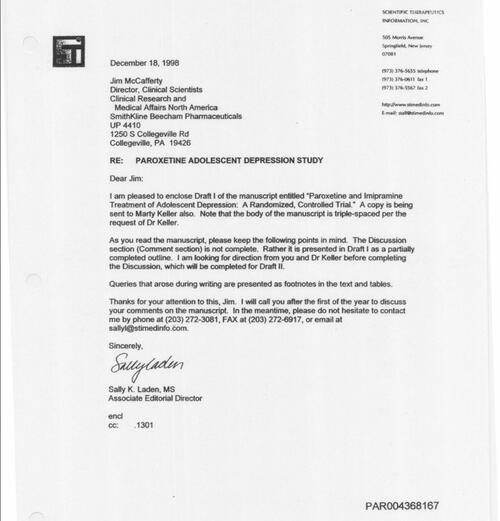Authored by Paul Thacker via The DisInformation Chronicle,
Hey, guys. During a MAHA Institute Round Table in DC last week, I talked about two studies published in peer reviewed journals as examples of corruption, one being GlaxoSmithKline’s Study 329, which alleged that Paxil was useful for treating depression in adolescents. We later discovered, through lawsuits, that Study 329 finding were distorted and an attorney is now suing the publisher to have it retracted.
I’ve been investigating and writing about Study 329 for almost twenty years as it stands out as one of the best documented case studies of corruption in modern biomedicine. Unfortunately, a piece I wrote for a DC nonprofit documenting much of this evidence disappeared in the last year as the publishing platform shut down. So I’m republishing that 2011 piece here so that it stays available for readers searching on Google.
Study 329 remains relevant because it highlights and underlines how immoral academics partner with Big Pharma to make money, while ignoring patient harm. When I wrote the piece in 2011, I was focused on one of Study 329’s authors: Stan Kutcher, a crooked psychiatry professor at Dalhousie University in Canada.
At the time, Kutcher was running for Parliament. Thankfully, he lost. But in 2019, Prime Minister Justin Trudeau picked Kutcher to be a member of Canada’s Senate, where he serves today.
Since that time, Kutcher has morphed himself into—get this!—an expert on misinformation. In January 2021, Kutcher partnered with “fact checker” and known misinformation crank, Timothy Caulfied at the University of Albera, to launch “Science Up First” which purported to attack COVID-19 conspiracies, but really served as a cheerleading squad for Big Pharma.
Kutcher has also been beavering away at limiting free speech under the guise of “controlling misinformation” because of course. Anyways, here’s the piece I wrote on Kutcher and Study 329 to help people understand how rampant Big Pharma corruption remains in academia.
Never forget what these people did to little children to make a quick buck.
Enjoy!
May 12, 2011
Author of Ghostwritten Study Runs for Parliament in Canada
By Paul Thacker
The night before I spoke last week at the University of Toronto conference on corporate funded ghostwriting in medicine, the university held a dinner at a French bistro for the conference speakers. It was election night in Canada and everyone at the table was buzzing about Dr. Stan Kutcher, a psychiatry professor at Dalhousie University who was running for Parliament.
Under legal threat from Dr. Kutcher, The Coast, a small Canadian newspaper, retracted and then apologized for a story that investigated a study Dr. Kutcher published on Paxil. Known as “Study 329,” this clinical trial was funded by GlaxoSmithKline (GSK) and concluded that Paxil is “generally well tolerated and effective for major depression in adolescents.”
Unfortunately for Dr. Kutcher, GSK was sued in the United States for hiding evidence of the link between Paxil and suicide. Numerous internal emails and documents are public and Study 329 now pops up in most discussion whenever experts talk about corruption in medical research.
Warning to readers: hold your nose. Study 329 really stinks.
If you’re new to the issue, corporate funded ghostwriting involves a pharmaceutical company that hires a PR firm to write medical studies. The PR firm then presents the manuscript to academic physicians to sign their names on as authors. Sometimes, the authors make only minor changes. The professors get credit for a publication to add to their CVs, and the pharma company gets a study that is “authored” by physicians who are leading researchers in their field and appear to be independent.
The practice of ghostwriting drives up the costs of healthcare, because these studies trick doctors into prescribing drugs that may be more costly, and sometimes less safe. These studies can also be used to seek approval by the FDA and payment from federal healthcare programs.
In the case of Study 329, GlaxoSmithKline used the study as a tool to market Paxil for use on children, until both the FDA and its British counterpart warned doctors to stop prescribing Paxil to children because it could cause them to commit suicide.
Last November, POGO sent a letter to National Institutes of Health (NIH) asking why taxpayers were funding researchers involved in Study 329 when it was ghostwritten and flawed.
Anyways, the retracted article in The Coast detailed some of Study 329’s problems and quoted Alison Bass, a former medical writer at The Boston Globe. Ms. Bass wrote an extensively referenced book titled Side Effects on the scandals and corruption involved in Study 329. The book was widely reviewed by media such as The New York Review of Books and The Canadian Medical Association Journal.
But her book isn’t the only detailed account of ethically questionable behavior in Study 329.
In January 2007, the BBC ran an investigative report on Study 329, calling it “one of the biggest medical scandals of recent times.” The BBC released several internal company documents purporting that GlaxoSmithKline knew that Study 329 was flawed years before the results were published. The BBC also quoted Fiona Godlee, editor of the British Medical Journal, who called Study 329 a “problem” in scientific research.
The list of studies and experts critiquing Study 329 goes on and on.
I vote for Paxil!
So with such an extensive public record on corruption in Study 329 (just use Google, for goodness sake!) how did Dr. Kutcher characterize Study 329?
“I don’t think that study caused any particular controversy,” he said. “There certainly is a group of people who would like to cause a controversy around it, but science is nasty, brutish and long.”
Nasty and brutish? No doubt. Especially, when all those documents and reports on Study 329 are splashed across the Internet.
Still, The Coast apparently ran afoul of Canadian law by publishing a negative story so close to the time of an election. After The Coast retracted and apologized, Dr. Kutcher dashed off a press release.
“It comes as a great surprise that The Coast is confusing opinion with science,” he wrote. Dr. Kutcher then crowed, “[T]his is something we are more accustomed to hear from the American right wing than the Canadian left wing.”
Yep. Right. Uh-huh.
Intrigued, I called the contact person listed at the bottom of the press release, Layton Dorey. When I asked if he had looked into the problems with Study 329, he said that I should contact Dr. Kutcher at his university.
Read the rest here...
Views expressed in this article are opinions of the author and do not necessarily reflect the views of ZeroHedge.
Loading recommendations...


